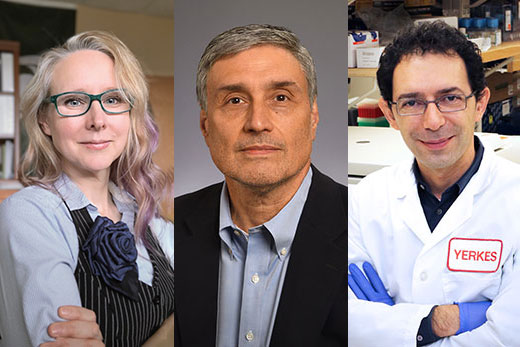ATLANTA – An Emory University-led research collaboration has been awarded a five-year, $23.8 million grant from the National Institutes of Health (NIH) to fast-track research to cure HIV infection or put it in permanent remission.
The Enterprise for Research and Advocacy to Stop and Eradicate HIV (ERASE HIV) is one of the 10 newly NIH-funded Martin Delaney Collaboratories for HIV Cure and the only one researchers at a National Primate Research Center (NPRC) are leading.
The Emory/Yerkes NPRC study leaders are Deanna Kulpa, PhD; Mirko Paiardini, PhD; and Guido Silvestri, MD. These leaders and their team members are renowned for their HIV cure research. As part of ERASE HIV, they will characterize the key immune system functions that control persistent HIV infection and design innovative, immune-based therapies to eliminate or control the virus in the absence of antiretroviral therapy (ART).
Kulpa is a Yerkes researcher and assistant professor of pathology and laboratory medicine in the Emory School of Medicine (SOM). Paiardini is contact principal investigator for ERASE HIV and also a Yerkes researcher and Emory SOM professor of pathology and laboratory medicine. Silvestri is Yerkes division chief of microbiology and immunology, Emory SOM professor and chair of the Department of Pathology and Laboratory Medicine, and a Georgia Research Alliance Eminent Scholar.
“It’s been 40 years since the first case of what we now know as HIV/AIDS was reported in the United States,” says Paiardini. “Since then, more than 700,000 people in America have died from HIV-related illness, and a similar number died worldwide just in the last year. Our work and the work of the other Martin Delaney Collaboratories will bring us closer to a cure, a goal now regarded as possible based on recent research advancements and the continuing dedication of HIV/AIDS researchers and advocates.
“HIV cure research is also important for increasing overall understanding of the immune system,” Paiardini continues. “This knowledge will help us develop immunological-based therapies that could provide additional treatment options for other infectious diseases as well as cancer.”
While ART has been successful in reducing HIV to undetectable levels and halting the progression to AIDS, the treatment does not eliminate HIV. The virus hides in the body and rebounds when people with HIV stop taking ART.
“Antiretroviral therapy has literally been a lifesaver for millions of people living with HIV around the world, but our work is not finished,” says Kulpa. “This NIH funding gives us the opportunity to build on Emory’s eminence as a worldwide leader in HIV/AIDS research and to assemble an incredible team of researchers and community advocates for the ERASE HIV Collaboratory.
“We are fortunate to work with SisterLove, Inc., the first women’s HIV/AIDS and reproductive justice organization in the Southeastern United States,” Kulpa adds. “The Atlanta-based organization leads community-based initiatives in HIV prevention, treatment and care, and will be instrumental in sharing ERASE HIV research advancements with all those SisterLove educates, inspires and serves.”
In addition to ERASE HIV, the Emory/Yerkes researchers also hold leading roles in three other newly awarded Martin Delaney Collaboratories:
- Pediatric Adolescent Virus Elimination (PAVE), co-led by Emory and Johns Hopkins University, and the only collaboratory focusing on curing pediatric HIV. Learn more about PAVE here.
- Collaboratory of AIDS Researchers for Eradication (CARE), led by University of North Carolina at Chapel Hill. This collaboratory, one of the two original Martin Delaney Collaboratory programs, will work with academic scientists and clinicians, industry investigators and the community to better understand persistent HIV infection and discover novel approaches to disrupt HIV latency, methods to clear the HIV reservoir and strategies to control viral rebound. Silvestri is co-leading this collaboratory, and PAVE co-lead Ann Chahroudi, MD, PhD, is a co-investigator.
- Reversing Immune Dysfunction for HIV-1 Eradication (RID), led by Sanford Burnham Prebys Medical Discovery Institute. The RID-HIV Collaboratory brings together leading university scientists from more than 10 academic institutions as well as Merck Research Laboratories and community members to understand the molecular and cellular basis for the loss of immune stability and function in people who are infected with HIV. The research team will harness this information to create immune-restoring treatment options, enhance viral reactivation and elimination strategies, and evaluate effectiveness in nonhuman primate models. These are all critical components of developing an HIV-1 cure. Rafick Sekaly, PhD, is co-leading this collaboratory. He is vice chair of translational medicine at Emory SOM and a Georgia Research Alliance Eminent Scholar. Paiardini is leading the Yerkes work for this collaboratory.
Emory, which is also home to the Emory Vaccine Center and the Center for AIDS Research, is recognized for developing HIV vaccine candidates and better treatments, such as Emtriva, which more than 90 percent of U.S. patients who have HIV take.
The Martin Delaney Collaboratories are funded by the National Institute for Allergy and Infectious Diseases and the National Institute of Mental Health as well as the Eunice Kennedy Shriver National Institute of Child Health and Human Development; the National Institute of Diabetes and Digestive and Kidney Diseases; the National Heart, Lung and Blood Institute; the National Institute on Drug Abuse; and the National Institute of Neurological Disorders and Stroke.
The collaboratory program was launched in 2010 in honor of the late HIV/AIDS activist Martin Delaney, who served on NIAID’s AIDS Research Advisory Committee. The goal of the program is to expedite HIV cure research by bringing together researchers from multiple academic institutions, as well as the private sector, community and government partners to share common resources, data and methodologies. Together, collaborators will coordinate complex research studies and mentor the next generation of HIV cure researchers.
The NIH award number for the ERASE HIV Collaboratory is 1UM1AI164562-01.
###

